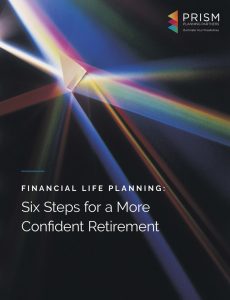How much does it cost for a comprehensive financial plan in Libertyville, IL? The amount varies, depending on the fee structure, depth of the plan, type of advisor and breadth of the ongoing relationship. It’s important to understand all of these elements if you’re in the market for a financial advisor.
Are you on the right financial path? Contact Prism Planning Partners today!
Fee Structure
Financial planners may use the following fee structures:
Flat Fees
A flat fee compensation structure is generally used for a specific service, such as the creation of a financial plan. Flat fees can range from $2,000 up to $7,500+, depending on the services rendered and their complexity.
At Prism Planning Partners we believe that fee transparency is important, that is why we list our fees on our website. Our typical financial planning onboarding fee is $6,500, but the cost can go up or down depending on the complexity and services requested.
Hourly Charges
Hourly rates are usually charged for one-time consulting or a special project, such as the creation of a financial plan. The charges can range anywhere from $200 to $500 per hour, but can be more or less based on complexity and advisor expertise.
Financial planners who offer only flat fees and hourly charges may not provide comprehensive advice, as fee-for-service may only focus on project work. If an ongoing, comprehensive relationship is what you’re looking for, make sure you clarify the scope of the relationship before engaging a fee-for-service advisor.
Percentage of Assets Under Management (AUM)
An AUM fee structure is a percentage of the total assets in your account. Most often, the range is typically between 0.5 percent and 1.5 percent. Some planners tier the structure, so the higher the levels of assets, the lower the percentage.
At Prism Planning Partners we offer Investment Management services to clients with a minimum of $500,000 investable assets. Our investment management fees are as follows:
1.25% first $1m
1.00% next $1m-$2m
0.50% any amount over $2m
Some of our clients prefer just to use our financial planning services, while others combine our planning and investment management services. Depending on client needs, complexities, and time commitment our fees may adjust. However, all fees will be fully disclosed and mutually agreed upon before any work is completed.
Commissions
Commissions typically involve a certain payment or percentage of the cost. Commissions can be charged on stock portfolio purchases or on specific types of products, such as insurance. As a rule of thumb, commissions typically range from 3 percent to 6 percent of the cost of the purchase, but can certainly be more or less. Commissions are not paid by clients, but rather they are paid by a third party to compensate a financial advisor for selling their product.
It is increasingly common for financial advisors to bundle several fee structures, using a fee structure for the initial set-up and development of a financial plan, for example, and an AUM structure for ongoing advice and portfolio management. More than half of financial advisors combine fee structures like this.
As you can see, flat fees and hourly charges are likely to be the least expensive, and AUM relatively more so. The cost of a commission-based plan can vary. But the cost is not determinative of which plan is the best. Investors also need to look at what they receive in return for the costs.
A Comprehensive Financial Plan: What Is It?
What is comprehensive advice? First, it covers all aspects of your financial life, including:
- Your monthly expenses and income from all sources
- Your investments
- Your retirement plan and funds
- Your educational savings plans for children and grandchildren
- Risk management strategies (insurance for assets)
- Estate planning (wills, powers of attorney)
Second, a comprehensive financial plan is tailored to your specific goals in concert with these categories. Why? Because everyone’s goals are different, everyone’s financial needs are different. The investment and retirement goals of people in their 20s can be very distinct from people in their 60s. You may want to fund higher education savings for five children, or for one (or none). You may want to leave your assets to family or start a charitable organization with them.
In our opinion, it’s best to engage with an advisor who can provide ongoing, relevant recommendations for your life circumstances. Why? Because, as life situations and goals change, a one-time recommendation may no longer be good or sufficient advice. Make sure you ask if your advisor is a fiduciary. A fiduciary must “stand in your shoes” and make sure that recommendations are in your best interests on an ongoing basis, not just at the time of sale.
Types of Advisors
Exploring the type of advisor is also as important as examining the cost (if not more so!) Financial advisors are held to one of three types of standards vis-à-vis their clients: the fiduciary standard, Regulation Best Interest, or the suitability standard.
The Securities and Exchange Commission recently established a ‘best interest’ regulation which requires brokers to act in the best interest of their clients. This is a change from the previous ‘suitability standard’ they were held to with regard to their clients. However, not all brokers are subject to this new regulation.
Always ask whether the advisor follows the fiduciary standard, the best interest regulation, or the suitability standard in addition to their costs.
Ongoing Services
It’s also important to consider whether an advisor provides ongoing services when considering costs. If you have investments and retirement plans, it’s prudent to review their performance at least once a year (and an advisor should provide semi-annual updates as well).
If you have a comprehensive financial plan, it’s also a good idea to review it at least once a year, to ascertain if life changes, financial or other changes or your goals necessitate adjustments in the plan.
Ongoing services can maximize your financial life – which needs to be factored into the costs of a financial plan.
What We Offer
The CERTIFIED FINANCIAL PLANNER™professionals at Prism Planning Partners are dedicated to helping our clients achieve their financial goals. Our services provide a holistic approach to planning for your golden years. Contact us today and let us illuminate your possibilities!




 Download our
Download our